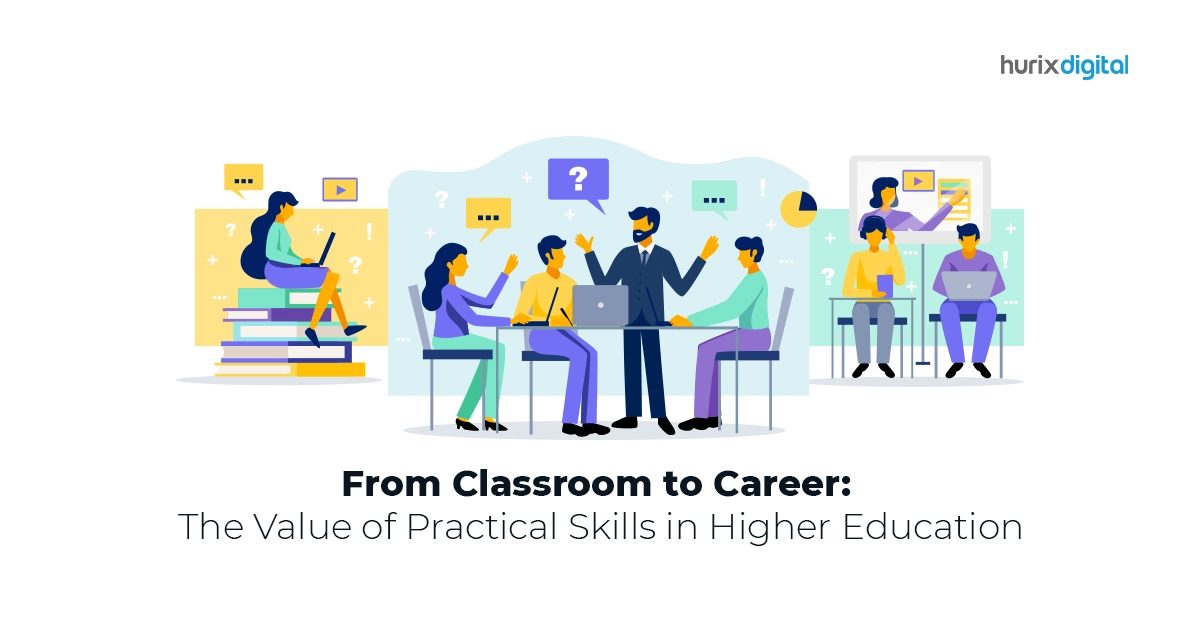From Classroom to Career: The Value of Practical Skills in Higher Education
Higher education has traditionally focused on theoretical knowledge across disciplines. However, in today’s rapidly evolving workplace, subject expertise alone is not enough. Employers increasingly seek graduates who possess practical skills to hit the ground running. This necessitates integrating practical skills in higher education that provide students with career-ready competencies.
Table of Contents:
- What are the challenges in higher education today?
- Why is it important to include practical skills in today’s curriculum?
- How can educators ensure practical education is part of the curriculum?
- Steps to design a practical learning based course
- How can we help?
What are the challenges in higher ed today?
- Gap between course competencies and job requirements
- Lack of hands-on training and applied learning experiences
- Overemphasis on theoretical knowledge
- Limited industry collaborations and work exposure
- Graduates not job-ready, leading to unemployment
A World Economic Forum study reveals that around 50% global employers are unable to find suitable talent as graduates lack skills to work in the current digitally-driven job market. Higher education curricula often fail to evolve rapidly enough and do not adequately emphasize career preparedness.
Why is it important to include practical skills in today’s curriculum?
- Better career opportunities and earnings for graduates
- Develop expertise beyond textbook concepts
- Gain real-world perspective and workplace readiness
- Apply learning through projects and vocational training
- Build in-demand capabilities like analysis, problem solving, communication, collaboration etc.
- Enable quick adaptation and productivity in jobs
- Acquire hands-on experience via internships, apprenticeships etc.
- Get better industry network and mentoring
How can educators ensure practical education is part of the curriculum?
- Consult industry experts to identify practical skills in demand
- Map course learning outcomes to specific job-related competencies
- Incorporate more application-focused pedagogies – case studies, labs, simulations, projects etc. rather than just theory
- Develop action-based assessments to test hands-on proficiency
- Enable collaboration via group assignments, peer learning
- Integrate workplace tools and technologies for familiarity
- Foster experiential learning through internships, co-ops, apprenticeships
- Partner with companies to provide onsite training, mentoring and live projects
- Hire industry professionals as adjunct faculty for domain expertise
- Leverage experts in eLearning and instructional design to build engaging applied curricula
Steps to design a practical learning based course
- Define career-oriented course outcomes and skills required
- Identify jobs and roles the course will prepare students for
- Analyze in-demand practical competencies expected for those roles
- Design projects, labs, simulations to impart those competencies
- Develop assessments to test application of skills
- Incorporate hands-on learning tools and real-world data sets
- Enable applied learning experiences via internships, field visits etc.
- Validate curriculum with industry partners for workplace relevance
- Leverage technology and online modes for effective delivery and scaling
The future of higher education depends enormously on how effectively institutions evolve curricula to develop skilled professionals ready for the 21st century workplace. An increased focus on practical competencies and experiential learning is key to enabling successful careers and driving innovation.
How can we help?
Transform higher education for career success with Hurix Digital. Get in touch for end-to-end solutions spanning digital courseware, customized LMS, competency frameworks, AI/ML labs and more. Contact Hurix Digital today to explore our higher ed solutions.

Senior Vice President – Business Development
Over 25 years of experience in the edtech and workforce learning industry with strong skills in Business Development, Customer Relationship Management (CRM) and Strategy.









